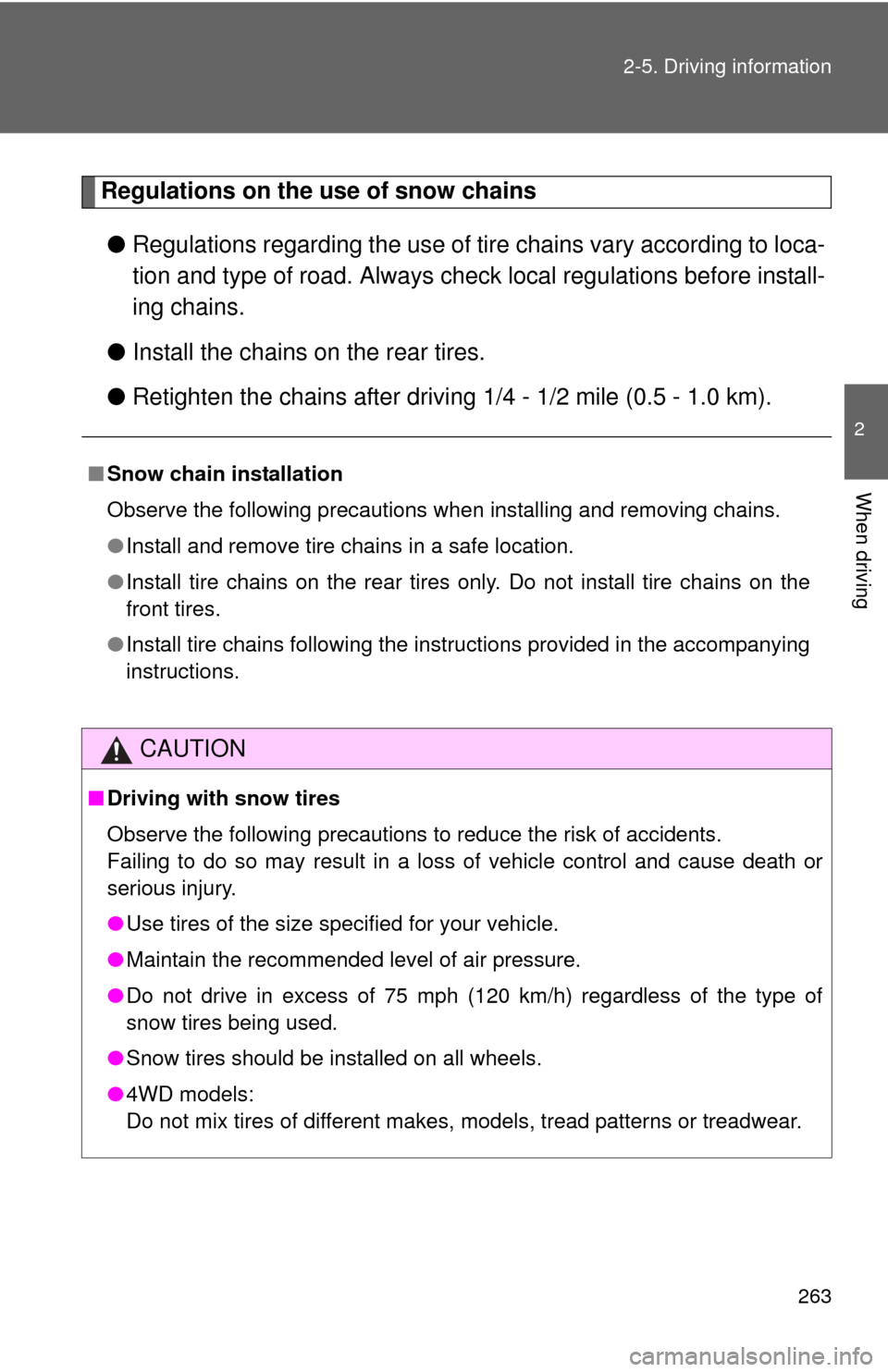Page 5 of 732

1
2
3
4
5
6
7
5
Compass ............................. 510
4-1. Maintenance and care Cleaning and protecting the vehicle exterior............ 516
Cleaning and protecting the vehicle interior............. 519
4-2. Maintenance Maintenance requirements ..................... 522
General maintenance.......... 524
Emission inspection and maintenance (I/M)
programs........................... 527
4-3. Do-it-yourself maintenance Do-it-yourself service precautions ....................... 528
Hood ................................... 532
Engine compartment ........... 533
Tires .................................... 547
Tire inflation pressure ......... 554
Wheels ................................ 558
Air conditioning filter............ 560
Wireless remote control battery ............................... 563
Checking and replacing fuses ................................. 565
Light bulbs........................... 576 5-1. Essential information
Emergency flashers............ 588
If your vehicle needs to be towed........................... 589
If you think something is wrong ............................... 595
Fuel pump shut off system .............................. 596
Event data recorder ............ 597
5-2. Steps to take in an emergency If a warning light turns on or a warning buzzer
sounds... .......................... 599
If a warning message is displayed (vehicles with
multi-information
display) ............................. 608
If you have a flat tire ........... 612
If the engine will not start.... 628
If the shift lever cannot be shifted from P ................... 630
If you lose your keys........... 633
If the vehicle battery is discharged........................ 634
If your vehicle overheats .... 637
If the vehicle becomes stuck ................................. 640
If your vehicle has to be stopped in
an emergency .................. 641
4Maintenance and care
5When trouble arises
Page 9 of 732
9
Tires
●Rotation
● Replacement
● Inflation pressure
● Information
P. 547
P. 612
P. 554, 665
P. 672
Fuel filler door P. 107
Back windowP. 98
Side doors P. 47
: If equipped
Tailgate P. 52
License plate lights P. 212
Stop/tail and rear side
marker lights
P. 212
Rear turn signal
lights
P. 189
Cargo lamps P. 450
Page 11 of 732
11
Tires
●Rotation
● Replacement
● Inflation pressure
● Information
P. 547
P. 612
P. 554, 665
P. 672
Fuel filler door P. 107
Back window
Power back window
P. 98
P. 99
Side doors P. 47
: If equipped
Tailgate P. 52
License plate lights P. 212
Rear turn signal
lights
P. 189
Cargo lamps P. 450Stop/tail and rear side
marker lights
P. 212
Page 13 of 732
13
Tires
●Rotation
● Replacement
● Inflation pressure
● Information
P. 547
P. 612
P. 554, 665
P. 672
Fuel filler door P. 107
Power back windowP. 99
Side doors P. 47
: If equipped
Tailgate P. 52
License plate lights P. 212
Rear turn signal
lights
P. 189
Cargo lamps P. 450Stop/tail and rear side
marker lights
P. 212
Page 28 of 732
28
Pictorial indexInstrument panel
Headlight switch
Turn signal lever
Fog light switch
1
P. 212
P. 189
P. 216
Windshield wipers and
washer switch
P. 217
Parking brake pedal P. 190
Gauges and meters P. 192
Hood lock release lever P. 532
Tire pressure warning reset
switch
P. 548
Passenger airbag off
switch
2 P. 131
SRS knee
airbag
P. 119
SRS knee airbag P. 119
Page 249 of 732

249
2-4. Using other
driving systems
2
When driving
CAUTION
Any of the following conditions may result in an accident which could cause
death or serious injury.
■The ABS does not opera te effectively when
● The limits of the gripping performance have been exceeded.
● The vehicle hydroplanes while driving at high speed on the wet or slick
road.
■ Stopping distance when the ABS is operating will exceed that of nor-
mal conditions
The ABS is not designed to shorten the vehicle’s stopping distance. Always
maintain a safe distance from the vehicle in front of you in the following situ-
ations.
● When driving on dirt, gravel or snow-covered roads
● When driving with tire chains
● When driving over bumps in the road
● When driving over roads with pothol es or roads with uneven roads
■ When VSC and Trailer Sway Control are activated
The slip indicator flashes. Always drive carefully. Reckless driving may
cause an accident. Exercise particular care when the indicator flashes.
■ TRAC or A-TRAC may not operate effectively when
Directional control and power may not be achievable while driving on slip-
pery road surfaces, even if TRAC or A-TRAC is operating.
Do not drive the vehicle in conditions where stability and power may be lost.
■ Replacing tires
Make sure that all tires are of the same size, brand, tread pattern and total
load capacity. In addition, make sure that the tires are inflated to the appro-
priate tire pressure level.
The ABS, VSC and Trailer Sway Control will not function correctly if different
tires are fitted on the vehicle.
Contact your Toyota dealer for further information when replacing tires or
wheels.
Page 263 of 732

263
2-5. Driving information
2
When driving
Regulations on the use of snow chains
● Regulations regarding the use of tire chains vary according to loca-
tion and type of road. Always check local regu lations before install-
ing chains.
● Install the chains on the rear tires.
● Retighten the chains after drivi ng 1/4 - 1/2 mile (0.5 - 1.0 km).
■Snow chain installation
Observe the following precautions when installing and removing chains.
●Install and remove tire chains in a safe location.
● Install tire chains on the rear tires only. Do not install tire chains on the
front tires.
● Install tire chains following the instructions provided in the accompanying
instructions.
CAUTION
■Driving with snow tires
Observe the following precautions to reduce the risk of accidents.
Failing to do so may result in a loss of vehicle control and cause death or
serious injury.
●Use tires of the size specified for your vehicle.
● Maintain the recommended level of air pressure.
● Do not drive in excess of 75 mph (120 km/h) regardless of the type of
snow tires being used.
● Snow tires should be installed on all wheels.
● 4WD models:
Do not mix tires of different makes, models, tread patterns or treadwear.
Page 264 of 732
264 2-5. Driving information
CAUTION
■Driving with snow chains
Observe the following precautions to reduce the risk of accidents.
Failing to do so may result in the vehicle being unable to be driven safely,
and may cause death or serious injury.
●Do not drive in excess of the speed limit specified for the tire chains being
used or 30 mph (50 km/h), whichever is lower.
● Avoid driving on bumpy road surfaces or over potholes.
● Avoid sudden turns and braking.
● Slow down sufficiently before entering a curve to ensure that vehicle con-
trol is maintained.
NOTICE
■Repairing or replacing snow tires
Request repairs of and obtain replac ement snow tires from Toyota deal-
ers or legitimate tire retailers.
This is because the removal and atta chment of snow tires affects the
operation of the tire pressure warning valves and transmitters.
■Fitting tire chains
The tire pressure warning valves and transmitters may not function cor-
rectly when tire chains are fitted.